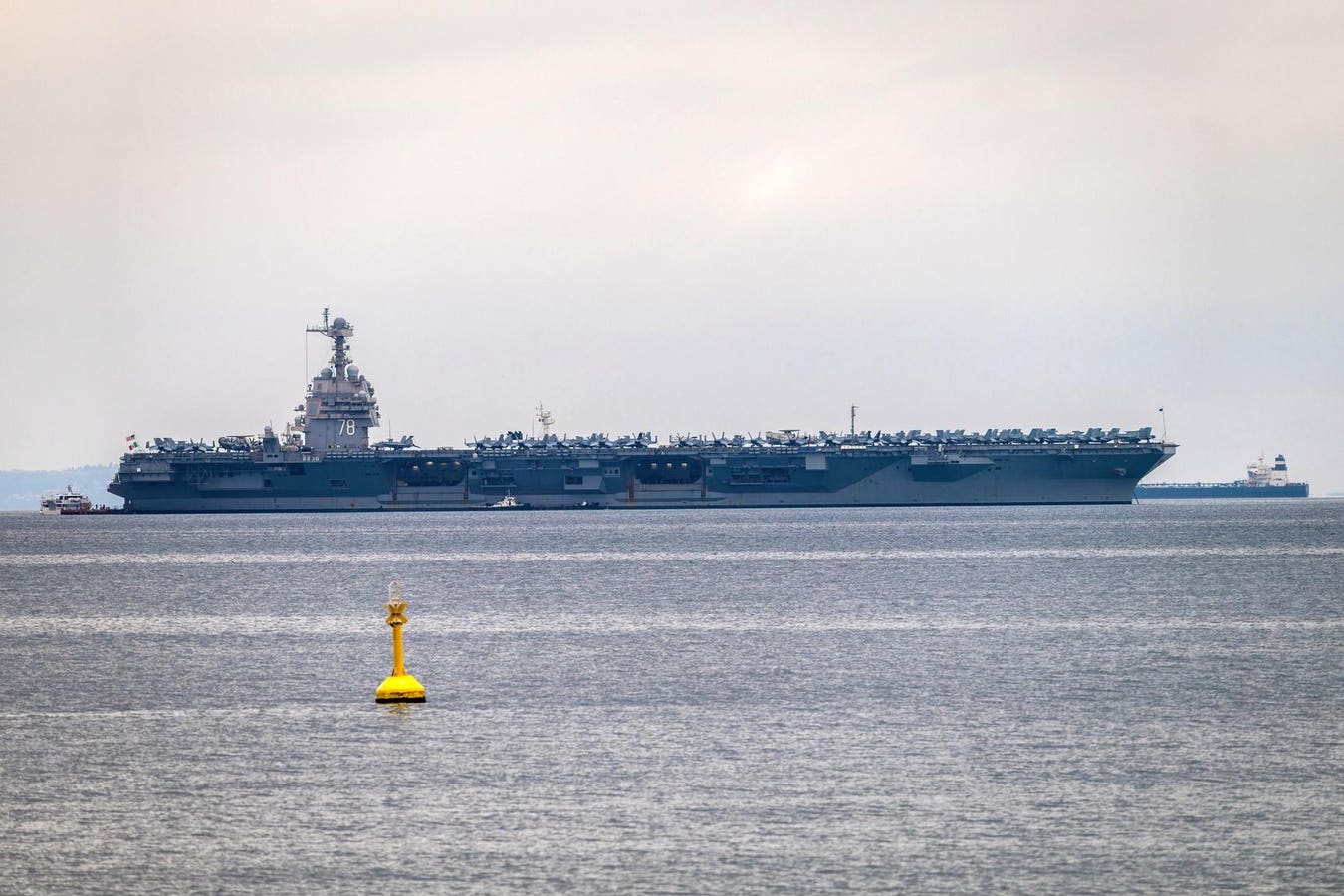The U.S. recently felt the need to make a clarification to a fellow NATO member country concerning its recent deployment of two carrier strike groups to the Eastern Mediterranean following Hamas’ deadly attack on Israel earlier this month.
“When we raise this issue with our U.S. counterparts, they tell us that those aircraft carrier groups were sent there as part of non-combatant evacuation operations for civilians in the region,” an official from the Turkish defense ministry told reporters on Thursday, according to Reuters.
Turkey has recently slammed the recent deployment of U.S. aircraft carrier strike groups — the Gerard R. Ford and Dwight D. Eisenhower — which followed the massacre of 1,400 Israelis by Hamas that began on Oct. 7 and Israel’s subsequent declaration of war on the militants in the Gaza Strip.
In his Oct. 10 visit to Austria, where he met Chancellor Karl Nehammer, Erdogan questioned the U.S. carrier deployments during a joint press conference.
“The U.S. is sending its aircraft vessel to Israel, but what is it doing in Israel? What is it coming to do?” Erdogan said, according to an English translation by Turkey’s TRT World news agency.
“And around the aircraft carrier, which is coming here with the boats and aircraft on the carrier, what will it do?” he added before declaring, “It will hit Iran, Gaza and demolish it, and it will be a step towards a serious massacre.”
Mere days later, the Turkish Navy issued a navigational telex (NAVTEX) announcing a four-day shooting exercise off the coast of Cyprus between Oct. 16-20. Turkish state-run Daily Sabah noted that while this was officially nothing more than “a routine firing drill,” it came “at a time of rising tensions” between Ankara and Washington over the latter’s deployment of carriers.
Sources cited by The Media Line speculated this Turkish naval activity seeks to convey to Turkey’s population and the outside world that Ankara is a player in the wider region.
It is not the first time Turkey has expressed discontentment with the U.S. naval presence in the Eastern Mediterranean — it’s not even the first time this year.
The Turkish Foreign Ministry issued a statement expressing “strong support” for the internationally-unrecognized Turkish Republic of Northern Cyprus when the government there condemned the docking of a U.S. submarine in Limassol, Republic of Cyprus, in April.
When the U.S. dispatched the aircraft carrier George H.W. Bush in February and offered humanitarian assistance to Turkey, after the country was devastated by an earthquake, conspiracies about the true nature of its deployment spread across Turkish social media, promoted by some journalists. The foreign minister at the time also declared Turkey would not allow the American carrier to enter its territorial waters.
Erdogan’s Oct. 10 comments came a mere day after he said Turkey would eventually respond to the U.S. downing of one of its armed drones over Syria, which was intercepted by a U.S. Air Force F-16 after it had entered a designated restricted zone with American troops in it on Oct. 5.
“There is no doubt that the incident has been engraved in our national memory and necessary action will certainly be taken when the time comes,” Erdogan declared.
In a recent editorial, Yasar Yakis, a former Turkish foreign minister, compared that shootdown with two historical low points in U.S.-Turkey relations.
The first was in 1992, when U.S. Sea Sparrow missiles hit the Turkish destroyer TCG Muavenet, killing seven crew members, including the captain. Washington insisted it was an accident and compensated Ankara. Still, many Turks believe it was intentional.
The second was the arrest by U.S. troops of Turkish soldiers in northern Iraq and the placement of hoods over their heads, the so-called “hood event,” in 2003, also widely condemned and well-remembered by Turks.
Yakis contends the present situation “leads us to question the validity of an alliance.”
“If two allies consider each other to be a potential threat, such an alliance is not worth holding,” he wrote.
Nevertheless, the U.S. seems eager to downplay any disagreements or tensions. The Pentagon spokesperson promptly called the drone shootdown “regrettable” and stressed there were “no indications” the unmanned Turkish aircraft intentionally sought to endanger U.S. troops. The U.S. also has not firmly condemned Turkey’s ongoing bombing of northeast Syria’s infrastructure and the targeting of Kurdish-led fighters the U.S. has partnered with against ISIS.
Furthermore, the clarification American officials have given the Turkish government regarding the nature of the current naval deployment mentioned on Thursday also seems aimed at reducing any potential tensions and misunderstandings between them.
It has been reasonably speculated that Washington doesn’t want to antagonize Ankara at the present time since it’s counting on Turkey imminently acceding to Sweden’s NATO admission.
Therefore, Erdogan may have calculated it is an opportune moment to feed into domestic and regional anti-American sentiment — presently at an all-time high due to the Israel-Hamas war — secure in the knowledge Washington wants to avoid any altercation with its nominal ally for the time being.
Read the full article here





